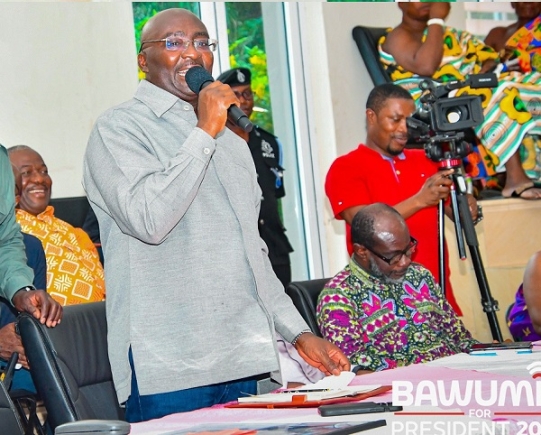
2024 Elections: Dr Bawumia preferred candidate: NDC most popular party: 23.1% undecided - Poll
A baseline survey report by a political scientist has highlighted the strengths of the National Democratic Congress (NDC) as a party, and Vice-President, Dr Mahamudu Bawumia, as a candidate for the 2024 general election.
It states that the flag bearer of the NPP, Dr Bawumia, leads as the preferred presidential candidate for the 2024 elections, although the NDC remains the preferred party for majority of the voter population.
The survey was conducted in April 2024. The survey report showed that 38.9 per cent of the respondents favoured Dr Bawumia, with 36.1 per cent preferring the flag bearer of the NDC, John Dramani Mahama.
The report, however, said the NDC led in “popularity” with 38.8 per cent as the political party Ghanaians were likely to support in the coming election. The popularity of NDC, it said, was higher than the NPP in Bono East, Greater Accra, Northern, Oti, Savannah, Upper East, Upper West and Volta regions, while both the NPP and NDC were at par in popularity in the Western North Region.
“A very large number of prospective party supporters — 23.1 per cent — were undecided on the party to support as at end of April 2024. Until they decide to take interest in one of the political parties, they may remain floating,” the report said.
“Most undecided region is Western, with 38 per cent undecided party supporters, while North East becomes the most decided region, with only 9.8 per cent undecided party supporters.
“All smaller parties put together are unpopular across the country as of April 30, 2024,” the report added.
Media engagement
Presenting the outcome of the survey at a media engagement in Kumasi yesterday, an Associate Professor of Statistics Research Design and Data Management Consultant, and Director of Research and Innovation, Kumasi Technical University, Prof. Smart Sarpong, said a sample size of 59,547 voters were engaged for the study although 16,557 would have been enough for a voting population — per total votes cast in the 2020 elections — at 99 per cent confidence level and one per cent margin of error.
Dr Bawumia
The report showed that Dr Bawumia as a candidate led in the Ahafo, Ashanti, Bono, Central, Eastern, North East, Western, and Western North regions. “All other presidential aspirants put together are making up to 3.6 per cent gains.
About 21.4 per cent of prospective voters are yet to decide which presidential candidate to vote for as at end of April 2024. They may remain floating until they decide to vote in favour of one of the presidential candidates,” the report said.
“Most decided region in favour of Dr Mahamudu Bawumia (NPP) is North East, with 60 per cent of voters going for him, while 75.7 per cent of voters in Volta Region have decided on John Dramani Mahama (NDC),” the report said.
In terms of popularity, NDC had 23,080 of the 59,546 study population, while the 20,564 of the number were in favour of the NPP. The other parties, still in relation with the popularity aspect, had 2,167, representing 3.6 per cent, with 13,735 — representing 23.1 — undecided.
On the issue of preferred candidate, the other parties had 2,114 (3.6 per cent), while the undecided group comprised 12,763 (21.4 per cent).
Press conference
“They (the study population) were selected from the full 275 sub-samples that make up the population. Each sub-sample represents a proportional share of total contribution to voter population as per the 2020 voter register.
Results from such a sample design are expected to be very reliable, stable and reflective of the views of the citizenry,” Prof. Sarpong said at the news conference. He said data collection for the baseline study lasted for 30 days, spanning April 1 to 30, 2024.
Prof. Sarpong said many interesting enquiries were sought from respondents, which would be published in subsequent publications on his social media handles, especially the constituency specific parliamentary level reports.
“When I predicted a first round victory on 51.4 per cent for NPP and skirt-and-blouse situation in elections 2020, many were the attacks I had to receive just for participating in the democratic process through elections research.
“My personality came under a more intense attack when, against the popularity of one of the aspirants in a regional contest, my findings after weeks of grass-roots investigations, predicted a win for the less popular candidate,” Prof. Sarpong said.
For fear of such vilification and attacks, he said fine brains who could contribute to the country’s democracy through elections research had decided to look on from their respective lecture halls.
“However, for all its limitations and disadvantages, elections research/polls produce better information about what people think, feel and want than any alternative politicians may prefer, especially the culture of silence and imposition of exclusion for academia and genuine researchers in Ghana’s political discourse.
Deciding factors
On the deciding factors the respondents considered in choosing a presidential candidate, competency formed 50.5 per cent; track record, 22.5 per cent; party affiliation, 19.1 per cent; financial inducement, 3.7 per cent; religion, 1.2 per cent; ethnic background, 0.9 per cent, while “none comes to mind” formed 2.2 per cent.
On the most critical challenge the next president must address, the respondents gave unemployment 21.1 per cent; inflation: 14.9 per cent; economic slow down: 14.8 per cent; poor roads: 14.7 per cent, water crisis: 10.05 per cent, power crisis: 8.3 per cent, illegal mining: 4.6 per cent, debt crisis: 4.0 per cent, LGBTQ Rights: 3.3 per cent, corruption: 1.6 per cent, sanitation and climate change: 1.3 per cent, while forest loss had 0.8 per cent.
